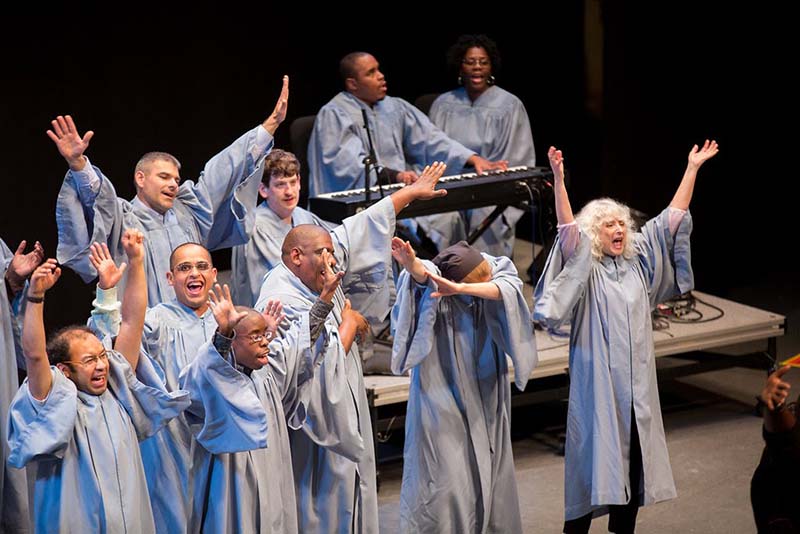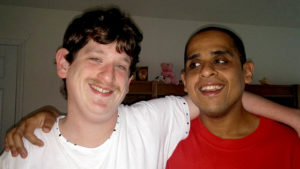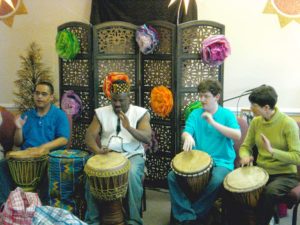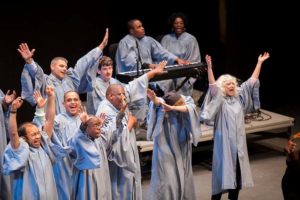



Like many Americans, brothers Alex and Ben Brode of Durham, North Carolina, went into lockdown due to the COVID-19 pandemic in mid-March. Their jobs were interrupted, and so were their opportunities for choral singing, sports, and other favorite activities.


The brothers, both Baha’is, have Fragile X Syndrome, a genetic condition that causes developmental impairments.
The pandemic disrupted more than two decades’ progress in their ability to thrive in the Baha’i community and in society. But it didn’t come close to wiping that progress out.
Pam Brode says she and the brothers’ dad, Roger Brode, “talk to them every day on the phone, pray with them [and] Zoom or FaceTime with them,” she relates. “We are grateful they are in good group homes with competent and caring staff.”
Earlier in their lives, any setback would have had grave consequences.
Great concern, great potential
At age 2, Alex was diagnosed with Fragile X. A physician informed the Brodes that their son would be severely to moderately intellectually impaired, with autistic behaviors. The news was devastating.
They were assured, however, that Alex “showed much potential, and with early intervention and the right support and services he could live a full, productive and happy life,” says Pam Brode.
Unfortunately, such support and services weren’t always available to the family.
Alex was placed in a “superb preschool” where they lived in Montgomery County, Maryland. “We received tremendous support from Alex’s special education team, and we saw our precious son advance in ways that we hadn’t thought possible,” she says.
In fact, says Brode, at age 3 Alex “shocked his speech therapist” by reciting from memory a Baha’i prayer, and the next year he “sang the prayer to a little tune he made up.”
The Baha’i community was likewise supportive.
Then Roger Brode, an atmospheric meteorologist, took a position in North Carolina with the Environmental Protection Agency.
Soon, she says, Alex was regressing. His preschool classes in Durham County were overcrowded and unsanitary; trained teachers and therapists were rare. What stung just as much, the small Baha’i community there was unsure how to approach the child.
“Alex often came home from his children’s Baha’i class in tears,” Pam Brode recalls. “He would repeatedly ask, ‘What is wrong with me?’
“It hurt him that none of the other children talked to him, and he was often the only child in class to not be invited to the other children’s birthday parties.”
Gaining knowledge and capacity
Change was in the wind, though. Six months after Ben was born with the same genetic condition, Pam Brode attended a national Fragile X conference in Colorado.
It was a “life-changer,” she says. “A mountain of information was offered” and she came home “newly energized and focused.”
Soon, she earned certification as an advocate for children with disabilities and was hired to work at the Duke Hospital’s Child Development Unit.
Tremendous challenges remained, Brode acknowledges, but quotes from the Baha’i writings encouraged her to stay the course. Two of them were:
The Brodes’ 1991 pilgrimage to holy sites of the Baha’i Faith in Israel also left them feeling “blessed and regenerated,” she says.
As did a letter from a senior institution of the Faith that assured them of “fervent prayers for your fortitude, for the children’s special education to realize their potentials, and for the discovery of specific information which may ameliorate their conditions.”
And a letter from a Baha’i she respected who noted that “one can appreciate the virtues of the little ones, however simple they may seem intellectually, whose hearts and souls are pure.”
Gradual improvements
In part because of Pam Brode’s efforts, special education in Durham improved exponentially in the 1990s. “It was a wondrous thing to witness the evolution of public schools in Durham through the years,” she reflects.


“We also saw the development of some good early intervention programs and there were some excellent programs that had popped up in place for children, teens and adults with special needs.”
She also witnessed changes in the local Baha’i community. Durham’s Spiritual Assembly, the local Baha’i governing council, “began showing greater support to our family, and even appointed me as adviser … concerning issues pertaining to persons with developmental disabilities.”
And the community responded positively to the suggestions that resulted.
“Many [community] members went out of their way to show the utmost love, kindness and acceptance to Alex and Ben,” she says, adding that the brothers began looking forward to community gatherings.
Something just as heartwarming happened soon afterward.
In July 2000, Durham hosted a two-week Baha’i youth gathering. As part of the program, youths from several states offered six days of service at a summer camp for young people with developmental disabilities. Alex and Ben were among those at the camp.
The youth volunteers “embraced a new awareness of the importance of inclusion of persons with disabilities in the Baha’i community,” says Brode.
One of the Baha’i youths remarked, “I had never worked with children and youth with mental and physical impairments and wasn’t sure at first what to expect.
“But as soon as I walked through the door of the camp clubhouse I met so many loving people. Their impairments didn’t matter. Everyone was having a good time.”
Another reflected, “Interacting with the kids at the camp made me realize that there’s no reason to separate the children and youth with impairments in the Baha’i community.
“We are all human beings. We need to create activities to make all children and youth in our community feel comfortable.”
Says Brode, “The Baha’i youth loved the campers, the campers loved the Baha’i youth, and Alex and Ben were thrilled to have new Baha’i friends at their camp.”
Sharing in a wider arena
The following year, the U.S. Baha’i National Spiritual Assembly asked Brode to conduct a workshop on “The Inclusion of Children with Developmental Disabilities in the Baha’i Community” at a conference in Milwaukee.
Brode heard many stories of frustration and despair from parents who felt their children’s learning needs were not being addressed and their behaviors misunderstood as unruly.
Wondrous things kept happening back in Durham, though.
“More and more Baha’is in my community were coming out to support activities for Alex and Ben, which played a major role in helping to improve their self-esteem and confidence when they attended Baha’i gatherings,” she recalls.
“It also helped Baha’is discover that people with developmental disabilities are very sweet, loving, pure souls with potentials to learn and achieve.”
In 2013, Ben participated in a Baha’i youth conference in Durham — one of more than 100 held around the world.
“I was surprised because Ben tends to be shy and often withdraws and clams up when he is out in public, especially in an unfamiliar and crowded environment,” says Brode. “But he was adamant to go.”
The conference was intended to be youth-only, but Brode got permission to accompany Ben. “Everywhere we went, Ben was showered with love and affection from the youth attendees and facilitators,” she recalls.
His participation in art projects at the conference “made him feel that he was a contributing participant. It was a very special experience for him.”
Strides toward independence
In the wider society, progress remained uneven. Alex was able to go live in a group home and get a job in a candle factory. But by the time Ben left high school, funding had been severely cut and the Brodes had to pay dearly for services and programs.


When the Affordable Care Act went into effect after 2010, though, “Ben began receiving funding for vocational training, supportive employment, counseling and many other invaluable services to meet his special needs.”
Because of the program, she says, “he also now resides in an excellent group home and he continues to blossom. Most importantly, he is very happy.”
The young men’s group homes are only a few miles apart, so prior to the pandemic they were able to see each other regularly.
And they were heavily involved in their music and sports activities: singing in the Reality Gospel Choir; playing the djembe in a drum circle at the Durham Baha’i Center; and earning county and state Special Olympics medals in soccer, basketball and track.
Every step of the way, the Brodes and many Baha’is from around the Triangle cluster of communities cheered them on.
Until the COVID-19 pandemic. Suddenly, Alex and Ben’s spring choral concert and their state sports competition were canceled.
“Persons with developmental disabilities are a high-risk population, and it is unknown when and if those programs will return,” says Brode.
But in the midst of that uncertainty, Ben’s employers at a temporarily shuttered restaurant sent him “a lovely text that made him very happy.”
It said: ‘”… remember, we value you and when we get through this, there will be a spot for you in our restaurant.’”
Sums up mom, “I can’t deny that the journey to advocate for Alex and Ben has been challenging. However, the successes and rewards are truly immeasurable and far outweigh the difficulties.”


![]()
![]()
Whether you are exploring the Bahá'í Faith or looking to become an active member, there are various ways you can connect with our community.
Please ensure that all the Required Fields* are completed before submitting.